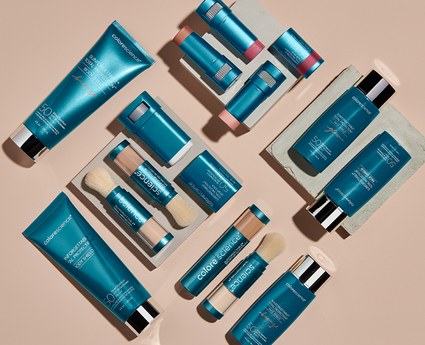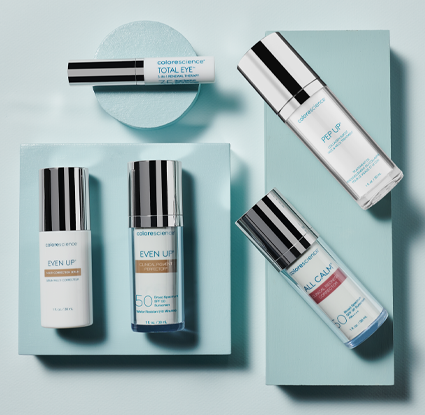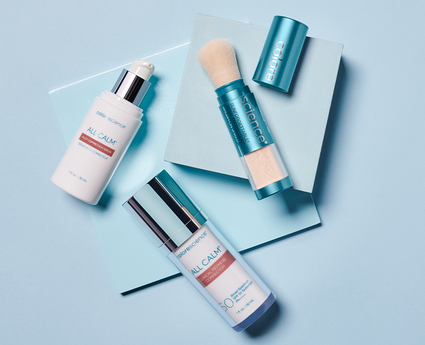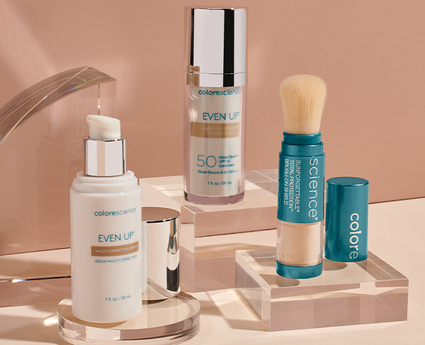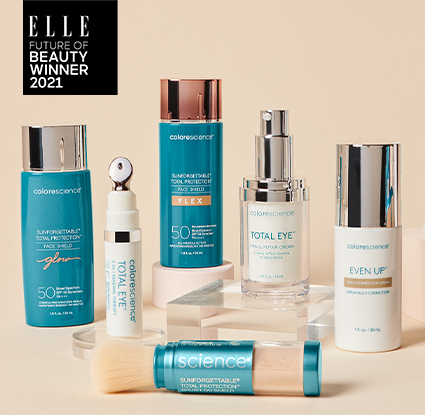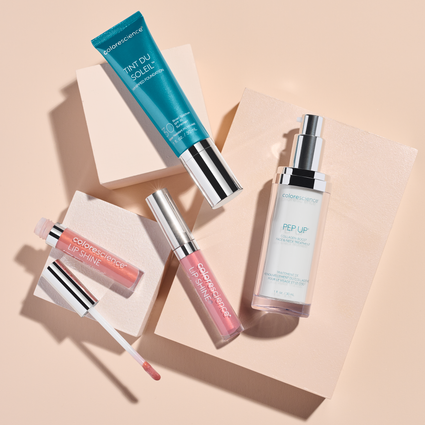What Is Broad-Spectrum Sunscreen?
When shopping for sunscreen, you likely see all types of new terms on labels, from various SPFs to broad-spectrum sunscreen. It can make selecting the right one a bit confusing, but we’re here to clear up your choices–at least when it comes to broad-spectrum sunscreen.
You may be wondering: what is broad-spectrum sunscreen? And why are so many people always talking about it?
In this article, we’ll take a closer look at broad-spectrum sunscreen, what it does, why you should be using it, and products to look out for. Keep reading or use the links below to learn more about broad-spectrum sunscreen.
- What is Broad-Spectrum Sunscreen
- Why Should You Use Broad-Spectrum Sunscreen
- What is the Best Broad-Spectrum Sunscreen
- Colorescience Broad-Spectrum Sunscreen Options
- Protect Your Skin to the Fullest
What is Broad-Spectrum Sunscreen?
You likely have a general understanding of sunscreen and why it’s essential, but you may be new to the concept of broad-spectrum sunscreen. Let us explain.
What is the meaning of broad-spectrum sunscreen? By definition, broad-spectrum sunscreen is meant to protect your skin from harmful UVA (ultraviolet A radiation) and UVB (ultraviolet B radiation) rays. UVB rays are the stronger of the two and can cause sunburns and most skin cancers. UVA rays are those that are typically responsible for premature aging but may also contribute to some skin cancers.

Before going out into the sun, double-check that your sunscreen meets the FDA requirements. To be considered a broad-spectrum sunscreen, it must be FDA-approved. An FDA-approved sunscreen will be labeled as ‘broad-spectrum”. While you’re looking for the broad-spectrum label, it’s also a good idea to check the SPF. According to the American Academy of Dermatology, SPF 30 filters out 97%, which is the recommended starting point for SPF levels.
There are various types of sunscreen out there, so next time you go shopping for one, keep in mind: what is broad spectrum in sunscreen, and you will likely find one protectant for your skin.
Why Should You Use Broad-Spectrum Sunscreen?

Now that you know the meaning of broad-spectrum sunscreen let’s look at why you should be implementing it into your daily routine.
Skin cancer
If not the most important reason, an essential factor of wearing broad spectrum sunscreen is to help prevent skin cancer. If you are out in the sun and your skin is unprotected, the UVA and UVB rays can penetrate deep into your skin, increasing your risk of skin cancer. So, if you want to protect yourself from skin cancer, you may want to look into using a broad-spectrum sunscreen with SPF 30 or higher.
Early aging
Another reason you should start using broad-spectrum sunscreen is to protect your skin against premature aging. Signs of premature aging can include fine lines, wrinkles, age spots, and saggy skin. To answer your burning question: does sunscreen prevent wrinkles? To an extent, yes. When you properly apply and reapply broad-spectrum sunscreen, it can prevent new damage and help you avoid intensifying the appearance of sunspots, age spots, and wrinkles.
Sunburn
This may seem crystal clear, but preventing sunscreen is an essential factor of using sunscreen. Nobody enjoys going out for a fun day in the sun only to have to deal with the consequences of a painful sunburn. Although not everyone may burn as quickly as others, you do not want to put yourself at the risk of burning, peeling, or blistering. Not to mention, a sunburn can take several days or weeks to heal, so you may have to alter your daily routine to protect your skin.
Daily SPF locks in the benefits of niacinamide by preventing new sun-induced dark spots from forming.

If you want to get that perfect tan, you can still do so while applying sunscreen. Next time you are out in the sun tanning, opt for a broad spectrum sunscreen, re-apply as needed, and still get some color. It may not be as dark or intense as it could be without sunscreen, but your skin’s protection is the most critical factor. You can always use bronze sunscreen for that summer glow.
A solid daytime routine means SPF on top, but you still need to decide serum or moisturizer first underneath your sunscreen.
To better protect your skin from the harmful effects of tanning, you may want to consider avoiding tanning beds at all costs as they lead to a higher chance of melanoma.
Healthy Skin
Overall, using sunscreen could give you healthier skin than what you started with, so if you want to protect yourself from collagen and skin damage, you may want to try adding a broad spectrum sunscreen to your morning skincare routine.
Once your broad-spectrum SPF is on, a simple routine that explains how to apply makeup keeps your skin protected and polished.
What Is the Best Broad-Spectrum Sunscreen?
Now that you know more about sunscreen, let’s answer the next burning question: what is the best broad-spectrum sunscreen? There are a few things you should look for when shopping for a broad-spectrum sunscreen solution.
You want to find an option with SPF 30 or higher as we mentioned earlier, but you may want to look for some extra protections as well. Your skin is exposed to many harsh chemicals and environmental factors such as UVA, UVB, blue light, infrared, and pollution, which can harshly damage the skin. Our mineral sunscreens feature EnviroScreen® Technology that helps protect you from these environmental factors.

Next, you want to look into active ingredients. Did you know that there are only two active ingredients that are considered GRASE (generally recognized as safe and effective) by the FDA? This includes titanium dioxide and zinc oxide. When used together, these active ingredients create a barrier on your skin to protect against the harmful UVA and UVB rays.
So next time you are shopping for a new sunscreen and feel puzzled by the multiple sunscreen products, look for one that is labeled as broad-spectrum with SPF 30 (or higher) and these two active ingredients. To make your shopping experience easier Colorescience has a variety of sunscreens that protect against environmental factors and use minerals that are safest for your skin.
Whether you are shopping for body sunscreen or face sunscreen, Colorescience has you covered with mineral sunscreens featuring a high SPF, non-chemical ingredients, and is easy to apply and reapply formulas. Learn more about our selection below.
Colorescience Broad-Spectrum Sunscreen Options

Now that you have the answer to “what is broad-spectrum in sunscreen?”, let’s talk more about your options from Colorescience.
Face Protection
Every person should be implementing a face sunscreen as the product may differ from a regular body sunscreen. Face sunscreens are crafted for the sensitive skin in this area and should generally leave your skin feeling light, hydrated, and ready to take on the sun. If you are looking for a broad-spectrum sunscreen for your face, here are some options to consider.
- Sunforgettable Total Protection Brush-On Shield: With new and improved brush flow, this product is the only powder sunscreen recommended by the Skin Cancer Foundation for active use.
- Sunforgettable Total Protection Face Shield Flex: This face shield offers tinted coverage for your skin in four shades and features our EnviroScreen® Technology to protect against various environmental factors.
- Sunforgettable Total Protection Face Shield Bronze: This 100% mineral protection formula also includes a bronze tint to give you a perfect glow year-round.
- Sunforgettable Total Protection Face Shield Matte: Our matte formula is designed for oily skin to absorb excess oil, blur out pores, and leave your skin complexion looking even and bright.
There are plenty more broad-spectrum sunscreen options available for your face. If you are unsure where to start, look into each product more and see which one is best for your needs depending on your preferences and lifestyle. For example, if you’re often on the go, you’ll want something easy to apply like our brush-on sunscreen or the sport stick. However, if you’re just using it at the beach, one of our liquid formulas is a classic choice.
Body Protection
If you are looking for a body sunscreen, here are a few products that make excellent protective options:
- Sunforgettable Total Protection Body Shield Classic: This body shield classic is SPF 50, water-resistant, and made from natural minerals to protect your skin. It’s also available in a bronze option.
- Sunforgettable Total Protection Sport Stick: Luckily, the sport stick can be applied to the face or body. This product is easy-to-apply and convenient to take with you on the go.
Whether the sunscreen is for your face or body, Colorescience ensures that our sunscreens use safe ingredients, are cruelty free products, gluten-free, fragrance-free, and more, so that everyone can find quality sun protection that works for them.
Protect Your Skin to the Fullest
As you can see, broad-spectrum sunscreen is a powerful way to protect yourself from early aging, painful sunburn, and most importantly skin cancer. And luckily, you have plenty of safe options from Colorescience, so it’s easy to find a solution that suits your needs–even if you want that glowing bronzy appearance. With broad-spectrum sunscreen on your side and reminders to reapply, you can enjoy your time out in the sun without worries about paying the consequences later.
Broad-spectrum protection pairs well with goji berry benefits for women, which support skin health and vitality at every age.
Can we apply moisturizer after sunscreen to maintain SPF integrity- Broad-spectrum defense works best when you know this.
Add Colorescience broad-spectrum sunscreen to your daily routine and enjoy the protection and peace of mind it can provide.

